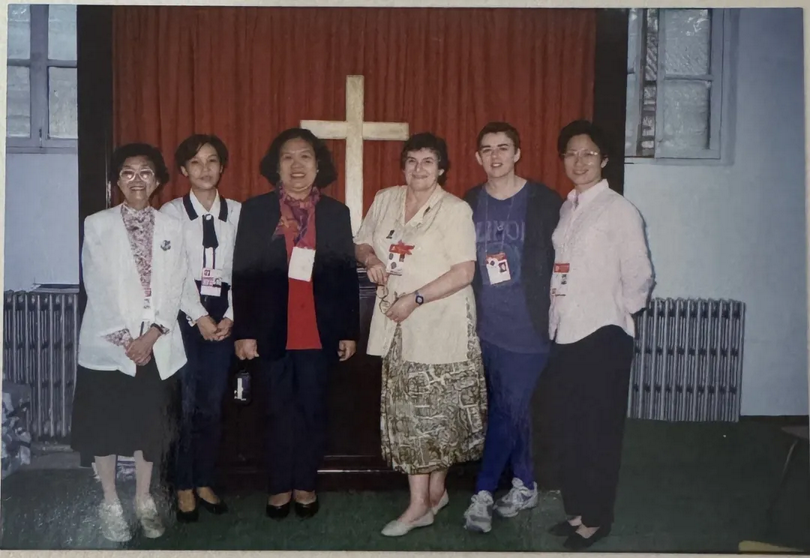China and UN Women co-hosted the Global Leaders' Meeting on Women in Beijing on Monday and Tuesday under the theme of "One Shared Future: New and Accelerated Process for Women's All-Round Development," drawing women leaders from more than 110 countries. Thirty years earlier, in the same city, a group of Chinese Protestant women joined more than 17,000 participants from 189 countries and regions at the historic Fourth World Conference on Women.
From September 4 to 15, 1995, the United Nations held the landmark conference under the theme "Action for Equality, Development and Peace," which led to the adoption of the Beijing Declaration and Platform for Action — a framework aimed at achieving gender equality and ending discrimination in both public and domestic spheres. It was during this conference that Chinese participants, especially Protestant women, were exposed to global gender justice conversations at the forefront of the movement.
Cao Shengjie, the first woman to serve as president of the China Christian Council (now retired), wrote in her recent article "The Gender and Role Consciousness of Chinese Christian Women — Recalling the UN's Fourth World Conference on Women" that the National Council of YWCAs of China organized a 30-member delegation to attend the NGO Forum held before the official conference. The delegation included Shi Ruzhang and Jin Wei, then the council's secretary general and deputy secretary general, along with several senior leaders of the CCC&TSPM. Jin Wei and Cao Shengjie also attended the official conference.
Cao said that many Christian women leaders from other countries also attended, including the president and secretary general of the World YMCA. The World Council of Churches held a series of seminars, and churches from different denominations organized various activities. "Some even wrote specific prayers, which were very inspiring," she said.
The National Council of YWCAs of China and the women's ministry committee, founded by CCC&TSPM in 1993, co-hosted a seminar during the conference. Cao delivered a speech titled "The Role of Chinese Christian Women in Education and Development," highlighting the church's efforts to combat illiteracy through Bible reading classes and telling stories of women serving both the church and wider society. The late Zheng Huaimei, then president of China YMCA, gave a keynote address titled "Faith Guides Us Forward," presenting reflections and suggestions on women's issues of the time from the perspective of a civic organization. 150 representatives from overseas YWCA branches viewed a PowerPoint presentation on the Ministry of China YWCA, and some attended Sunday worship at Beijing Chongwenmen Church.
After the conference, the women's ministry committee expanded its work nationwide to promote gender equality. Cao herself delivered 10 reports within and beyond the church in China and wrote an article introducing the biblical and theological basis for the statements made by Christian women's groups from various countries at the forum.
Cao wrote that the belief that "men are superior to women" is a remnant of traditional Chinese culture, though modern Chinese law protects women's rights. "Gender equality is a social issue," she stated.
While discriminatory practices have been reduced since the founding of the People's Republic of China, deep-seated cultural concepts are not easily eliminated, Cao noted. "In the early days, men and women were not allowed to sit together in church services," she said. "There was a high percentage of women in our churches. Despite their devotion and emphasis on Bible reading, many, with limited education, could only interpret the Bible literally. Passages that appeared to demean women, such as Paul's exhortation for women to remain quiet and submissive, reinforced this belief."
Growing up in the church, Cao said her understanding of these biblical texts changed after attending a World Council of Churches training in 1991. Women's theology, she noted, teaches that both men and women are made in the image of God and are united in Christ. The role of Eve as Adam's helper does not imply inferiority, and Paul's letters should be interpreted historically, holistically, and spiritually.
Cao went on to write that women were once banned from ordination. Florence Li Tim-Oi (1907–1992) from Hong Kong became the first woman ordained as a priest in the global Anglican Communion during the war against Japanese aggression in China to meet pastoral needs. Her priesthood was later rejected by the wider communion after the war, leading to her resignation. When churches in China reopened for united worship in 1979, women were finally permitted to be ordained. By 2020, women accounted for an estimated 42 percent of ordained pastors in registered churches in China. Now, eight women serve as chief leaders in the 27 provincial CC&TSPMs, and 77 hold deputy leadership roles.












